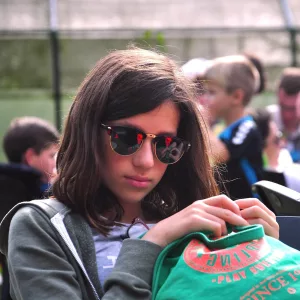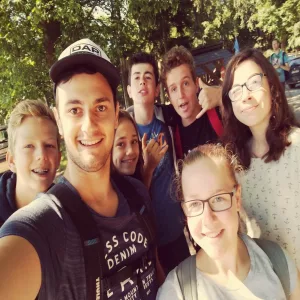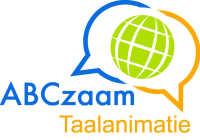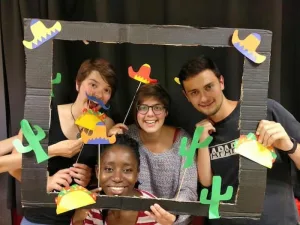Most frequently asked questions from parents



All « classic » sports: mini-football, basketball, volleyball, baseball, hockey, ping-pong, tennis, mountain biking… But also more « quiet » sports: pétanque, cricket, mini-golf, … For the more experienced, less common sports: tree climbing, paintball in the forest, etc. We try to vary the sports since each discipline has its own vocabulary. The young person chooses the sport he wants to practice.
There are four and a half hours of lessons per day, including half an hour of “synthesis”. Twice an hour in the morning and twice an hour in the afternoon. Our teachers have a fun approach and work on the four skills of learning a language, namely: listening comprehension, reading comprehension, written expression and oral expression. This last skill is the one we focus on the most.
It depends on the course, the age and the level of the young people. There is an entrance test. Generally, there are between 6 and 10 students per class. We favor small classes, particularly among the youngest.
When we ask our students about this, they answer the same thing: It takes an adaptation time which lasts two days. This adaptation time comes from the fact that they must dare to take the plunge, that they must learn reflexes and learn to understand someone in a communication situation. These young people add that they are happy that the days are busy and the activities varied. This avoids not “internalizing” the difficulties, letting yourself be carried away by the wave and, ultimately, acquiring reflexes fairly quickly. So, no, it’s not « difficult ». If this were the case, we would not have more than 70% of our young people returning to our internships. In immersion, since we are in a concrete communication situation, we learn a language exactly as we learned our mother tongue. Is it “difficult” to learn your mother tongue?
We have observed in recent years that, in the field, coming to an internship with a friend does not pose a problem in terms of language immersion. And this is due to two essential factors: 1. The supervision at ABCzaam is such that we are able to ensure that all young people express themselves in the language of the internship. 2. The number of young people per course has been limited to a maximum of 50 young people, thus making our courses much more user-friendly. So, today, we can confirm to you that, on the contrary, the presence of a friend or girlfriend often motivates young people to achieve their goals.
Yes. That said, we draw attention to the fact that, of course, grammar is important and is an effective help to improve when you already have certain basics; but it is not THE priority. Grammar is a practical and useful tool if you are already able to express yourself. What’s the point of knowing grammar rules if you already don’t feel comfortable communicating in Dutch? The various language teaching organizations are more and more aware of this, just look at the advertising slogans used recently: “Stop studying languages, start practicing them!” Or, from the Maison de Langues in Liège: “Languages are as easy as cycling.” (Implied, that you have to climb on it, in other words, immerse yourself in order to practice a language.) For our part, our ABCzaam 2014 campaign was also very colorful since we compared language teaching with obtaining a driving license, pointing out that at school, we learned the theoretical rules and that during the ABCzaam course, we learned to use the vehicle.
When your child arrives at the internship, they take a test which will allow us to assess their oral, written and comprehension skills. Thanks to our brand new computer system, all parents are kept informed of their child’s results. After a week, we evaluate their skills for the first time to see if they are progressing and if the courses are effective. If the results are reassuring, the young person will take a final test at the end of the course. All of the young person’s results are followed from year to year by ABCzaam members as well as parents, through private access to our site.
1. With supervision which is – in moments of uncertainty (bar, travel, etc.) – of 1 adult for three young people, it is impossible to speak your mother tongue in an ABCzaam course. 2. Our management is trained so that this does not happen: in our jargon, it is the system of “DISPERSION”. It is the obligation of all our language facilitators to NEVER leave the young people and to make them communicate, play, sing, etc. 3. Thanks to our constructive approach, we manage to motivate young people to “play the game”. Now, we understand the doubts expressed by some parents who tell us that they have been deceived by false advertising from other organizations… It is regrettable, of course, we know that. Do not register your young person with an organization without calling and asking questions! The same goes for certain internships which are very expensive and take place abroad… Ask us for advice, as a non-profit association, we are first and foremost at your service! Our telephone number is 04 253 26 30.
A. Few organizations in Belgium offer such support for young people: 1 adult / 3 young people and, obviously, for purely financial reasons. It is the supervision that allows the young person to communicate, to have fun, to want to respect the rules, or even, as one young person said recently, “to have this feeling of being able to learn with complete confidence”. Let me be clear, without this supervision, it is impossible to carry out an immersion course worthy of the name. B. A fact important and rare enough to be noted: Those responsible for the creation of ABCzaam are themselves present during the courses to ensure that they run smoothly. There are therefore few or no intermediaries between the parents and the founders of the association.
It depends on your goals and those of your child. Now, many participants tell us that learning Dutch first helps them learn English later. The opposite is not always true.
Thanks to the IT tools that we have put in place, we can follow the progress of each learner during the different courses in which they participate. This allows us to support each young person in an individualized manner throughout their learning.
No. GSM is not prohibited. We ask parents that this be given to the Management so that the young person can, at the most opportune time of their day, have it available to send a text message. In addition, we have put a system in place so that parents can receive at least two emails during the course. Parents can obviously also send emails and letters to their child. In addition, parents receive a telephone number allowing them to contact a manager directly to obtain news about their child. Finally, parents can see numerous photos and videos of the course every day.
Want to ask a question?
You don’t see the answer to your question here, don’t hesitate to ask, we will answer it as quickly as possible.

